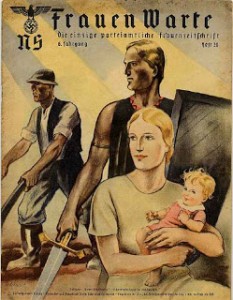3 Points:
– “The Jew has suffered no privations!”. Hitler is attempting to rally the Christian population (many of those who are very poor) by blaming the Jews as the reason the majority of the populace is suffering economically. He states that the Jews go to a doctor’s office to “lose his fat” instead of going to get healthy, like a good, hard working German. He slanders them in order to rouse public disdain regarding these people, which would make it easier to expel them from the country/commit anti-semitic acts.
– Hitler pushed the idea of a “nationalist, socialist party” (Nazi). In this creation he would emphasize the state empowering characteristics of each wing, and minimize the radicals sitting on each end of the spectrum. The people on the “Right” and the people on the “Left” would bring the country to ruin if they were able to take control. If the party of compromises was not the one in power, there would be only two possibilities: “the victory of the Aryan or the annihilation of the Aryan and the victory of the Jew.”
– Since there would be only one race in his ideal Germany (Aryan), Hitler wishes there to be no class system. “Class means caste and caste means race”: ipso facto if there is only one race, then there is only one class, meaning there is no traditional “class system”.
2 Questions:
– In his last lines, Hitler says that he is creating this party (and everything that goes on within it) because he wanted to build an institution that people can take solace in in order to “bring calm to their hearts”. Knowing what you know about how this party system ended (WWII), what would have been a better way about calming his people down?
– In this passage Hitler makes it quite clear that he opposes the Treaty of Versailles. Given what he states in this speech, what part of the treaty do you believe he disliked the most?
Interesting Observation:
– Hitler uses the fears and concerns of the people to his advantage. Germany at this point in time was a country without a strong leadership; they needed someone to take control and lead them into the next chapter of their history. Hitler saw that they were a weak people, and took advantage by implanting his thoughts into their minds. By offering the populace the answers they sought, he was able to get the whole country on his side, making it much easier for him to impose his will.

